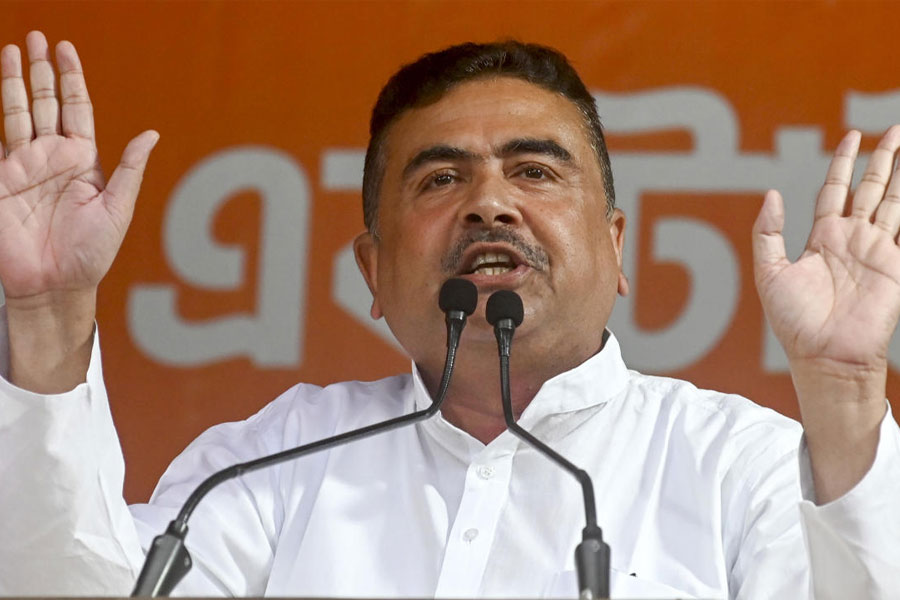Charges of corruption have singed the Mamata Banerjee government’s efforts to implement safety measures at its hospitals following the RG Kar atrocity.
Leader of the Opposition Suvendu Adhikari has alleged the government paid “exorbitant prices” for the CCTVs that the state health department installed in two state-run medical colleges in Arambagh and Jhargram.
The Mamata government began installing security cameras across Bengal’s state-run medical colleges after the August 9 rape and murder of a postgraduate trainee at RG Kar Medical College and Hospital triggered protests, with doctors alleging a lack of workplace safety.
Adhikari wrote on his X handle that the health department had installed 50 cameras at the Prafulla Chandra Sen Government Medical College and Hospital in Arambagh, Hooghly, spending over ₹1.75 crore, which comes to an average of about ₹3.5 lakh per camera installation.
In the same post, the BJP leader said the average cost of installing a camera at the Jhargram Government Medical College and Hospital, where 195 CCTVs have been put up, was about ₹1.65 lakh.
He did not spell out what he thought the real average cost of installation should be.
“Astonishing. Unbelievable and Utterly Shameless. Everyone knows that the Mamata Banerjee govt is the epitome of corruption, but this time they have outdone themselves,” Adhikari wrote.
While the government has not reacted formally, a source in the health department said the allegation had come as an embarrassment for Nabanna and that an internal probe was likely to be ordered soon.
The trigger behind the likely probe, the source said, was an initial assessment that the outgo from the state’s coffers for CCTV installation in these two institutes was “significantly higher” than that incurred in the government medical facilities in the cities.
“A total of 531 CCTV cameras, along with an automatic number-plate recognition system, were installed at RG Kar by spending about ₹3.57 crore, which means an average cost of about ₹67,266 per camera,” the source said.
A CCTV surveillance system generally includes cameras, switching devices, optical fibre cables and copper cables, servers and storage units, a UPS unit and display monitors.
The cost of installation depends on factors such as the area covered, the quality of image required, the number of days of backup necessary, video analytic requirements and the quality of the network and the camera.
“Our initial assessment suggests the system at RG Kar is superior as it also includes an automatic number-plate recogniser.… Besides, the cost of laying down cables on the campus must have been higher as RG Kar has a higher floor area than the two district facilities,” a health department official said.
Another source, who claimed knowledge of the technical specifications for the installation process on the various campuses, said the CCTV cameras at RG Kar were more “sophisticated” than those installed in the districts.
“The lenses of these (RG Kar) cameras have adjustable focal lengths.… They also have the flexibility to adjust the angle of view and the level of zoom, according to the requirements. The CCTV cameras installed in Arambagh and Jhagram are not that sophisticated,” the source said.
After speaking to multiple sources in the health department, this correspondent learnt that while the PWD installed the CCTVs at the city facilities, Webel, the state government’s nodal IT agency, did so in the two district hospitals.
Of the nearly 8,000 CCTVs installed so far, the PWD accounts for more than 5,000, and Webel for the rest. The two agencies selected vendors for the job by floating tenders and inviting bids.
A senior Webel official denied Adhikari’s allegation.
“If the authorities want to install 500 cameras within the network, it can be done easily with the infrastructure we have created.… If the number of cameras goes up, the average price per CCTV would naturally come down,” the official said, requesting anonymity.
“The network is so strong that the authorities can use it for keeping attendance records and other data-driven services, too.”
A source in the health department said the government was aware that the average price generally falls as the number of cameras goes up.
“A controversy has arisen because of several factors; that’s why the authorities are planning a detailed probe,” the source said.
“The entire tendering process was a bit problematic as there was no clear mention of the specifications for the cameras or associated devices.… This may have led to different costs in different places. Only a proper investigation can reveal what, if anything, went wrong.”











